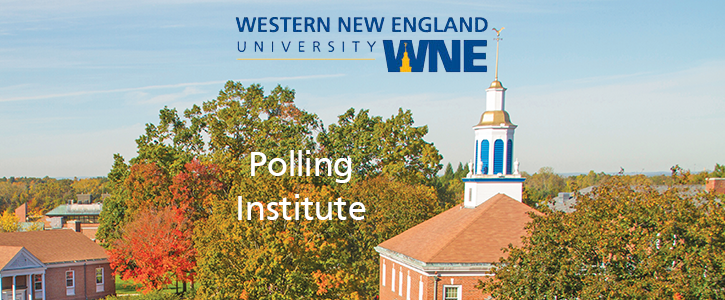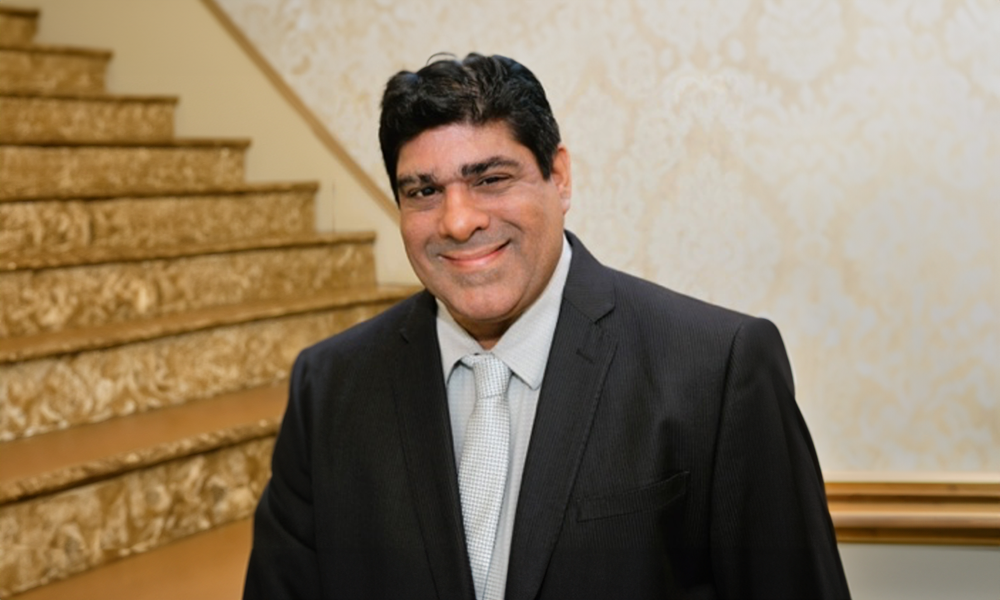Nearly two-thirds of Massachusetts residents say it is very or somewhat likely that climate change will pose a serious threat to them or their way of life during their lifetime, according to the latest survey from the Western New England University Polling Institute.
The statewide telephone survey of 439 adults, conducted Oct. 17 through Nov. 1, found that 32 percent viewed the threat as very likely and 32 percent viewed the threat as somewhat likely, while 22 percent said not very likely and 13 percent said not at all likely. The survey has a margin of error of plus or minus five percentage points.
Those responding to the survey painted an even darker picture for future generations. Eighty-eight percent said it is very or somewhat likely that climate change will pose a serious threat to the way of life of future generations.
But the survey also found some signs of hope. More than two-thirds of adults – 68 percent – think it is possible for humanity to take actions to reverse the effects of climate change. And about half of adults – 53 percent – said they had made changes in their daily lives in the past 12 months in response to public discussion about climate change. The two most frequently cited categories of changes were increased recycling (23 percent) and reduced use of plastic bags, straws, and containers (22 percent).
"Massachusetts residents clearly see climate change as an important issue with potentially serious negative consequences," said Tim Vercellotti, director of the Polling Institute and a professor of political science at Western New England University. "At the same time, a majority of those who answered the survey reported that they were changing their behavior in response to public discussion of the issue. They seem to be trying to live by the adage of ‘think globally and act locally.'"
The survey also found:
- 29 percent of adults are following news about climate change very closely and 50 percent are following the news somewhat closely;
- 60 percent said that recent marches by young people have been very or somewhat effective in focusing public attention on climate change;
- In regard to youth activism and the marches, 69 percent of adults said that young people generally do know enough to have meaningful views on climate change, while 26 percent said they do not know enough to have meaningful views on climate change;
- 67 percent said that climate change is caused mostly by human activity, such as burning fossil fuels, 19 percent said climate change is caused mostly by natural patterns in the Earth’s environment, nine percent said climate change is caused by both human activity and natural patterns, and two percent said climate change does not exist.
Views on climate change varied significantly by political partisanship, gender, age, and education. Democrats, women, adults ages 18 to 39, and college graduates were more likely than others to express concern about climate change and its potential effects.
The sample of 439 adults included 405 self-identified registered voters. Among voters who said they were registered as Democrats, 81 percent said that climate change was very or somewhat likely to pose a serious threat to them or their way of life, while the same was true for 57 percent of unenrolled voters and only 39 percent of Republicans. Ninety-eight percent of Democrats said that climate change was very or somewhat likely to pose a serious threat to the way of life of future generations, compared to 86 percent of unenrolled voters and 63 percent of Republicans. When asked about the causes of climate change, 87 percent of Democrats said it was caused mostly by human activity, compared to 61 percent of unenrolled voters and 37 percent of Republicans. Forty-two percent of Republicans said that climate change was caused mostly by natural patterns in the Earth's environment, compared to 23 percent of unenrolled voters and just five percent of Democrats. Democrats were almost twice as likely as Republicans to say it is possible for humanity to reverse the effects of climate change, with 86 percent of Democrats voicing that view compared to 44 percent of Republicans and 64 percent of unenrolled voters.
Women and men also had significantly different views on climate-related issues. Seventy-five percent of women said it is very or somewhat likely that climate change will pose a serious threat to them or their way of life compared to 52 percent of men. The gap was smaller regarding the threat to future generations, with 90 percent of women and 84 percent of men saying climate change was very likely or somewhat likely to pose a threat. A larger proportion of women – 72 percent – said climate change was caused mostly by human activity, compared to 61 percent of men. Women were somewhat more optimistic than men regarding the prospects for reversing the effects of climate change, with 74 percent of women saying that it is possible compared to 63 percent of men.
Views varied by education level as well, although the gaps were somewhat smaller than along other demographic lines. Sixty-eight percent of college graduates said climate change was very or somewhat likely to pose a serious threat to them or their way of life, compared to 61 percent of those with a high school diploma or less. The gap was wider when it came to future generations, with 90 percent of college graduates saying climate change was very or somewhat likely to pose a serious threat to future generations, compared to 76 percent of those with a high school diploma or less. Sixty-eight percent of college graduates said that climate change was caused mostly by human activity, compared to 62 percent of those with a high school diploma or less. Nearly three-quarters of college graduates – 74 percent – said it is possible for humanity to reverse the effects of climate change, compared to 51 percent of those with a high school diploma or less.
Younger respondents also were more likely to see present and future threats from climate change. Seventy-nine percent of respondents in the age range of 18 to 39 said that climate change was very or somewhat likely to pose a serious threat to them or their way of life, compared to 54 percent of those ages 65 and older. Ninety-five percent of respondents in the 18-to-39-year-old category said the same was true for future generations, compared to 85 percent of those ages 65 and older. There was a 19 percentage-point gap between the age groups regarding whether climate change is caused mostly by human activity, with 78 percent of 18- to 39-year-olds saying that that is the case compared to 59 percent of those ages 65 and older. But when it comes to whether it is possible for humanity to reverse the effects of climate change, the two age groups were closer together in their patterns of response, with 69 percent of 18- to 39-year-olds and 73 percent of those ages 65 and older saying it is still possible to reverse the effects.
Differences by political party, gender, and education also emerged when the survey asked respondents whether they had made any changes in their daily lives in the past 12 months in response to public discussion about climate change. Sixty-eight percent of Democrats said they had, compared to 37 percent of Republicans and 50 percent of unenrolled voters. Sixty percent of women said yes, compared to 46 percent of men. Sixty-two percent of college graduates said yes, compared to 37 percent of those with a high school diploma or less. Responses did not follow a consistent pattern by age, with yes responses coming from 53 percent of those ages 18 to 39, 59 percent of those ages 40 to 54, 46 percent of those ages 55 to 64, and 55 percent of those ages 65 and older.
Survey participants who said they had made changes received an open-ended follow-up question in which they were asked to describe, in a sentence or two, one such change they had made in the past 12 months. The Polling Institute coded the responses into broad categories. The most common change that respondents reported was increasing recycling (23 percent); followed by reducing use of plastic bags, straws, and containers (22 percent); driving a more energy-efficient car, or driving less and using mass transit, biking, or walking instead, 19 percent; and conserving electricity, heat, or water at home, or using more energy-efficient appliances or light bulbs, 13 percent.
Significant differences also emerged regarding whether young people, who have staged protests around the world concerning climate change, know enough to have meaningful views on the issue. Overall, 69 percent of adults said young people do know enough, and 26 percent said they do not know enough, and responses from the smaller group of registered voters followed the same pattern.
As with many of the other measures, responses to the question varied by party, gender, and education level. Ninety percent of Democrats said that young people know enough to have meaningful views on the issue, compared to 64 percent of unenrolled voters and 27 percent of Republicans. Eighty percent of women said young people know enough, compared to 58 percent of men. Among college graduates, 72 percent said the same, compared to 59 percent of those with a high school diploma or less. There was less variation by age, with 74 percent of 18- to 39-year-olds, 66 percent of those in the 40 to 54 age group, 67 percent of those in the 55 to 64 percent age group, and 70 percent of those age 65 and older saying young people know enough to have meaningful views on the issue.
"While views on the ability of young people to have a meaningful say on the issue varied along the lines of party, gender, and education, from a generational standpoint the differences are not as great," Vercellotti said.
METHODOLOGY
The Western New England University Polling Institute conducted a telephone survey using live interviewers Oct. 17 – Nov. 1, 2019. Western New England University sponsored and funded the study. The survey sample consists of telephone interviews in English only with 439 adults ages 18 and older drawn from across Massachusetts using random-digit-dialing of landlines and cell phones. The sample yielded 405 adults who said they are registered to vote in Massachusetts. Interviewers at the Polling Institute dialed household telephone numbers, known as “landline numbers,” and cell phone numbers using random samples obtained from Dynata of Shelton, CT. In order to draw a representative sample from the landline numbers, interviewers alternated asking for the youngest adult male or the youngest adult female age 18 or older who was home at the time of the call. Interviewers dialing cell phone numbers interviewed the respondent who answered the cell phone after confirming three things: (1) that the respondent was in a safe setting to complete the survey; (2) that the respondent was an adult age 18 or older; and (3) that the respondent was a resident of Massachusetts. The sample of all adults consisted of 161 interviews completed on landlines and 278 interviews completed on cell phones. The landline and cell phone data were combined and weighted to reflect the adult population of Massachusetts by gender, race, age, and county of residence using U.S. Census estimates for Massachusetts. The data also were weighted to adjust for cell phone and landline usage based on state-level estimates for Massachusetts from the National Center for Health Statistics. Complete results of the poll and the full text of the landline and cell phone versions of the survey are available at http://www1.wne.edu/polling-institute/index.cfm.
All surveys are subject to sampling error, which is the expected probable difference between interviewing everyone in a population versus a scientific sampling drawn from that population. The margin of sampling error for a sample of 439 adults is +/- 5 percent at a 95 percent confidence interval, and the margin of sampling error for a sample of 405 registered voters is +/- 5 percent at a 95 percent confidence interval. Thus if 65 percent of adults said that climate change is caused mostly by human activity, one would be 95 percent sure that the true figure would be between 60 percent and 70 percent (65 percent +/- 5 percent) had all adults in Massachusetts been interviewed, rather than just a sample. Sampling error increases as the sample size decreases, so statements based on various population subgroups are subject to more error than are statements based on the total sample. Sampling error does not take into account other sources of variation inherent in public opinion studies, such as non-response, question wording, or context effects.
Established in 2005, the Western New England University Polling Institute conducts research on issues of importance to Massachusetts and the region. The Institute provides the University’s faculty and students with opportunities to participate in public opinion research. The Institute is a charter member of the Transparency Initiative, sponsored by the American Association for Public Opinion Research. The Transparency Initiative supports greater openness in the reporting of survey research methodology. Additional information about the Polling Institute is available from Dr. Tim Vercellotti, director of the Polling Institute, at polling@wne.edu.





